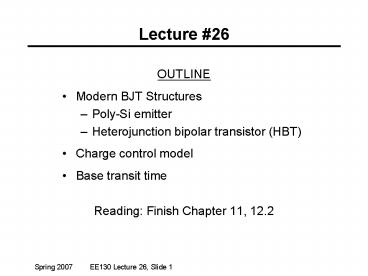OUTLINE - PowerPoint PPT Presentation
1 / 12
Title:
OUTLINE
Description:
Modern BJT Structure Polycrystalline-Silicon (Poly-Si) Emitter Emitter Gummel Number w/ Poly-Si Emitter Emitter Band Gap Narrowing Narrow Band Gap (SiGe) ... – PowerPoint PPT presentation
Number of Views:27
Avg rating:3.0/5.0
Title: OUTLINE
1
Lecture 26
- OUTLINE
- Modern BJT Structures
- Poly-Si emitter
- Heterojunction bipolar transistor (HBT)
- Charge control model
- Base transit time
- Reading Finish Chapter 11, 12.2
2
Modern BJT Structure
- Narrow base
- n poly-Si emitter
- Self-aligned p poly-Si base contacts
- Lightly-doped collector
- Heavily-doped epitaxial subcollector
- Shallow trenches and deep trenches filled with
SiO2 - for electrical isolation
3
Polycrystalline-Silicon (Poly-Si) Emitter
- bdc is larger for a poly-Si emitter BJT as
compared with an all-crystalline emitter BJT, due
to reduced dpE(x)/dx at the edge of the emitter
depletion region
Continuity of hole current in emitter
4
Emitter Gummel Number w/ Poly-Si Emitter
where Sp ? DEpoly/WEpoly is the surface
recombination velocity
For a uniformly doped emitter,
5
Emitter Band Gap Narrowing
To achieve large bdc, NE is typically very large,
so that band gap narrowing (Lecture 8, Slide 5)
is significant.
DEGE is negligible for NE lt 1E18/cm3 N 1018
cm-3 DEG 35 meV N 1019 cm-3 DEG 75 meV
6
Narrow Band Gap (SiGe) Base
- To improve bdc, we can increase niB by using a
base material (Si1-xGex) that has a smaller band
gap - for x 0.2, DEGB is 0.1eV
- Note that this allows a large bdc to be achieved
with large NB (even gtNE), which is advantageous
for - reducing base resistance
- increasing Early voltage (VA)
7
EXAMPLE Emitter Band Gap Narrowing
If DB 3DE , WE 3WB , NB 1018 cm-3, and niB2
ni2, find bdc for (a) NE 1019 cm-3, (b) NE
1020 cm-3, and (c) NE 1019 cm-3 and a
Si1-xGex base with DEgB 60 meV (a) At NE 1019
cm-3, DEgE ? 35 meV (b) At NE 1020cm-3,
DEgE ? 160 meV (c)
8
Charge Control Model
A PNP BJT biased in the forward-active mode has
excess minority-carrier charge QB stored in the
quasi-neutral base
In steady state,
9
Base Transit Time, tt
- time required for minority carriers to diffuse
across the base - sets the switching speed limit of the transistor
10
Relationship between tB and tt
- The time required for one minority carrier to
recombine in the base is much longer than the
time it takes for a minority carrier to cross the
quasi-neutral base region.
11
Drift Transistor Built-in Base Field
The base transit time can be reduced by building
into the base an electric field that aids the
flow of minority carriers.
- Fixed EgB , NB decreases from emitter end to
collector end.
B
-
E
C
Ec
Ef
Ev
- Fixed NB , EgB decreases from emitter end to
collector end.
-
E
B
C
dE
1
C
E
Ec
Ef
dx
q
Ev
12
EXAMPLE Drift Transistor
- Given an npn BJT with W0.1mm and NB1017cm-3
(mn800cm2/V?s), find tt and estimate the base
electric field required to reduce tt












![[PDF] DOWNLOAD FREE Clinical Outline of Oral Pathology: Diagnosis and PowerPoint PPT Presentation](https://s3.amazonaws.com/images.powershow.com/10076578.th0.jpg?_=20240711025)


![[READ]⚡PDF✔ Black Letter Outline on Contracts (Black Letter Outlines) 5th Edition PowerPoint PPT Presentation](https://s3.amazonaws.com/images.powershow.com/10044064.th0.jpg?_=20240531080)















